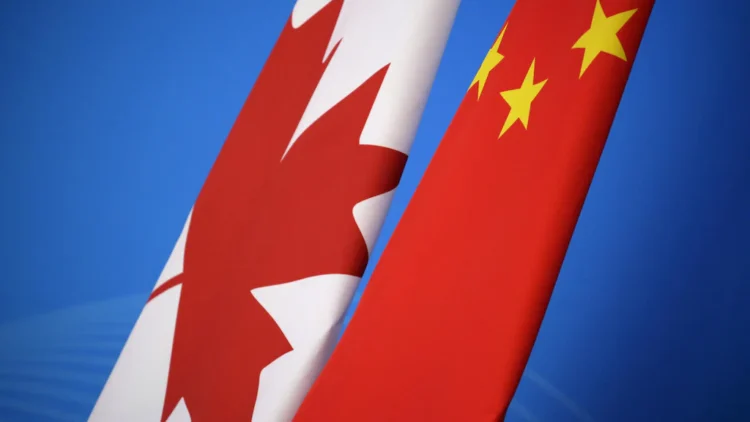The Canadian government has strongly condemned the execution of several Canadians in China earlier this year, following charges related to drug offenses, as claimed by Beijing.
A spokesperson from Global Affairs Canada confirmed the executions but did not specify the number of Canadians involved. “Global Affairs Canada confirms that earlier this year, Canadians were executed in the People’s Republic of China. Canada strongly condemns the use of the death penalty, as it is irreversible and goes against the fundamental principles of human dignity,” said Charlotte MacLeod in a statement. “Canada has repeatedly called for clemency for these individuals at the highest levels and remains firm in opposing the death penalty in all circumstances.”
In response, the Chinese Embassy in Canada defended the executions, asserting that the rights of the Canadian nationals involved were fully protected. The embassy emphasized China’s strict stance on drug-related crimes and the “zero tolerance” policy on drug offenses. “The crimes committed by the Canadian nationals involved are clear, with ample and solid evidence,” the statement read. “We urge Canada to respect China’s judicial sovereignty and the rule of law, cease making irresponsible comments, and work with China to improve and develop bilateral relations.”
However, the embassy did not provide specific details about the crimes or the identities of the Canadians involved.
Global Affairs Canada confirmed it was offering support to the families of the victims but would not disclose further details due to privacy considerations.
The executions were first reported by the Globe and Mail, which learned of the events earlier this week. Canada confirmed that Robert Schellenberg, a Canadian from Abbotsford, B.C., who had been arrested in 2014 on drug smuggling charges and sentenced to death years later, was not among those executed. “Canada continues to advocate for clemency for Robert Schellenberg and provides him and his family with consular assistance,” MacLeod stated.
A Global Affairs official, speaking on background, revealed that around 100 Canadian citizens are currently detained in China.
China has the highest rate of executions in the world, carrying out more executions than any other country combined, according to Amnesty International. While the exact number remains classified, human rights groups estimate over 1,000 executions in 2022 alone. It is believed that more than 2,000 executions occurred in previous years. The Cornell Center on the Death Penalty Worldwide states that “possibly thousands” of people are on death row in China at any given time, with many executed within two months of sentencing. Media reports represent only a small fraction of executions carried out.
Guy Saint-Jacques, a former Canadian ambassador to China, recalled efforts to prevent executions of two Canadians of Chinese descent on drug trafficking charges during his tenure. Despite personal appeals from former Prime Minister Stephen Harper and former Governor General David Johnston to Chinese officials, including President Xi Jinping, the executions proceeded. “Despite all those efforts, the Chinese authorities went ahead with the executions,” he said. “Our interventions at best delayed the execution by perhaps a year.”
Between 2019 and 2020, at least four Canadians were sentenced to death for alleged drug smuggling, including Schellenberg, whose sentence was upgraded to death following a retrial in 2019. During this period, relations between Canada and China were strained due to the Canadian detention of Huawei CFO Meng Wanzhou and China’s subsequent arrest of Canadians Michael Kovrig and Michael Spavor.
The identities of the other three Canadians sentenced to death—Ye Jianhui, Xu Weihong, and Fan Wei—are unclear.
Though efforts to improve relations began in 2021 with the release of Wanzhou and the “Two Michaels,” tensions have resurfaced over Canada’s imposition of tariffs on Chinese electric vehicles and related components, triggering retaliation from China. Additionally, the Trump administration had urged Canada to take stronger actions against China regarding fentanyl trafficking and market access in the North American auto industry.
In late 2024, Canada imposed sanctions on eight Chinese officials accused of “grave human rights violations” against ethnic and religious minorities, including Uyghurs, and raised concerns about the situation in Hong Kong. Beijing responded angrily, accusing Canada of hypocrisy, citing Canada’s historical treatment of Indigenous peoples.
“We are facing a difficult period in our relationship with China,” said Saint-Jacques, noting that there could be potential for a reset after Canada’s upcoming federal election. He emphasized that Canada should work with like-minded countries to pressure China to modernize its practices and abolish the death penalty while cautioning Canadians about the risks they face. “We need to make it clear to Canadians that if they travel to China, they should avoid any involvement in drug trafficking and travel with a Canadian passport to ensure consular access,” he advised.

 English
English



























































